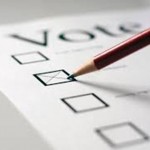Oh dear, I hear you say, not another political rant when we are facing all those pressures we get in the run up to a general election. No, this is different if only because it has no political party in its sights and not even one politician. This is all about what has gone wrong in our democratic process.
Fewer people are bothering to vote. This can be seen by the gradual decline in total numbers voting over the years since WW2.
Think tanks and pundits of all descriptions have weighed into a loose discussion every five years or so. On the broad evidence provided we know that some parliamentary seats are fixed in that voting will always favour one of the parties.
In those areas people who wish to vote for a different party feel that their vote is wasted because it will make no difference to the outcome.
Then we have the marginals where the result may be in doubt as voters have chosen different party respresentatives in past elections. Here a great amount of energy is expended by all sides in an effort to retain or regain or even replace with an entirely new party representative.
This disproportionate involvement by parties creates a mass confusion and a greater reaction for or against voting. Around the country whatever the predominant flavour of votes cast there is a growing body of people who simply will not vote. They may give slightly different reasons but their intentions are clear.
Half a century ago electionsconcerned only the two main parties; now we have a proliferation of smaller parties all attempting to ‘get into the act’. Those smaller parties will eat into the votes for the major ones and some surprises will result yet it will still be the two main parties who dominate.
You might think that these smaller parties could stir up more interest and encourage some non-voters to change their habit and put a cross in one or other box. Unlikely. It will be existing voters switching from the main parties and giving the latter a bit more of a fright.
So what is it that has created this disaffection? One man, one vote is the bedrock of democracy. For any democracy to work it needs involvement of those entitled to vote. We understand the importance of voting yet increasing numbers are switching off.
On recent figures fully one third of the electorate are not exercising their right. They have, in effect, disenfranchised themselves.
One over simplistic response is that they are abdicating their responsibility. There are comments about Australia where voting is enforced and that perhaps we should do the same. Would that really be the democratic response?
We have a generally accepted method of debate leading to a decision of those for, those against and those who abstain. I have always considered that in any circumstance where the alternatives on offer are not to my liking then abstention is the answer for me.
If we think about the one third with a clear mind then what is the reason(s)? To me, this indicates that none of the ‘offers’ are acceptable and/or believable, bolstered perhaps by past experience and a serious mistrust of all exhortations from any party representative.
This is so deep that not even the introduction of new alternatives, alternatives that may have the power to bring about change are considered. There is this Westminster club and then there is the rest of us.
There is little or no connection between the two. And this has arisen, gradually, as we have progressed from dire needs to simple wants and thence to ample supply. Within a lifetime we have seen changes that could not previously have been imagined.
Satisfaction leads to contentment. Less interest in the how and more in the we. Should we go to that meeting? There are so many more interesting things for us to do. More and more, elections amount to less impact upon each individual, in the main, while those who are really impacted have a very small voice. And it is within that small voice that we can find those who abstain. They are trying to get on with their lives as best they can while knowing that nothing they would wish to see will ever happen.
Democracy allows for the election of one party, usually, which then forms a government. That government is empowered to govern for the whole electorate, not for those who voted for that party or a chosen few.
As governments have failed to take account of that small voice, increasingly, so they have created that gap between them and us which is widening. I suggest that this is at the root of what is wrong with our present democracy.
by Peter Bray



